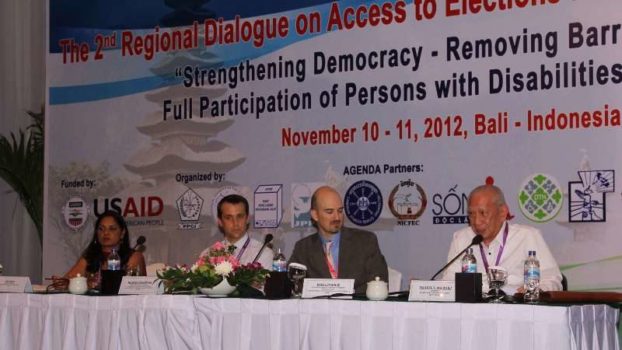When it comes to improving election accessibility for persons with disabilities, different countries have different experiences. Sharing experiences and lessons learned between different countries is crucial because it enables people working in the disability field to find inspiration and creative ideas that may be applicable to their own countries, thus encouraging improvement and progress.
On the first day of the Second Regional Dialogue on Access to Elections for Persons with Disabilities, three presenters shared experiences from very different backgrounds.
Director of Governance Policy and Senior Specialist in the Governance and Social Development (GSD) branch of Australian Aid Michael Bergman came to the table with extensive experience working in countries in the Pacific. Chairman of the Alyansa Ng May Kapansanang Pinoy (AKAP –PINOY) Manuel Agcoili has both a business background and a wealth of experience working in the nonprofit sector. Tika Dahal, the secretary general of the National Federation of the Disabled Nepal (NFDN), is an experienced social worker who has been working to improve the lives of persons with disabilities in Nepal for close to two decades. All three panelists offered insights into how countries can improve access to the political process for persons with disabilities.
Panelists stated that donors can play an important role in improving the accessibility of elections, but noted that host countries should take the lead by devising policies and setting targets. Donors should support host countries’ policies by providing funds or expertise.
Bergman shared AusAid’s experience working with the Papua New Guinea (PNG) Electoral Committee. In 2012, in the most recent election in PNG, the PNG Election Committee ran a pilot project to improve electoral participation of persons with disabilities with financial support from AusAid. The PNG Election Committee opened a special voting center for persons with disabilities in Port Moresby, the capital city – the first time such a polling station was opened. More than 200 persons with disabilities voted in the polling station. The committee also dispatched buses to transport people with disabilities to polling stations.
Before the election, the PNG Election Committee, in cooperation with disability centers in PNG, ran an enrollment exercise to get persons with disabilities to register for the election. The exercise took place in the National Capital District from November 2011 to April 2012, but was then extended to include another three provinces in PNG. At the end of the exercise, 226 persons with disabilities were added to the electoral roll.
Another lesson the panelists shared is the importance of working closely with the election organizer. This point was highlighted by Agcoili, who has been working with the Philippines Commission on Election (COMELEC) for years to get disability representation in the lower house of the Philippine parliament. He said that cooperation and collaboration are the preferred methods for working with the government. By working together, he and his colleagues managed to create an atmosphere of understanding among COMELEC commissioners.
Agcoili and colleagues then established an organization called Pilipinos with Disabilities Inc. (PWD) in 2011. Together they lobbied the COMELEC to get accreditation, which they received in late September 2012, to allow PWD to participate in the next election as a party-list sectoral organization. This means the disability community in the Philippines will soon have a representative in parliament.
Agcoili said that COMELEC’s support has been crucial. The commission assigned one of its members to work on disability issues. Measures taken by the COMELEC include an information dissemination campaign to assist persons with disabilities to register in elections and special registration events, among others.
As a result, the COMELEC is able to get approximately 385,000 new and previously registered voters with disabilities to register (or re-register) and update their profiles in their database.
The last speaker, Dahal, shared the many barriers and obstacles faced by persons with disabilities who attempt to participate in the electoral process in Nepal. Dahal said the number of persons with disabilities in Nepal is between 1 and 10 percent of the total population. However, most of their needs have not been accommodated yet in the electoral process. Of all the various laws and regulations concerning electoral participation, not one mentions persons with disability.
Dahal said the last election in Nepal happened in 2008. Since then, Nepal has been unable to hold elections due to the constitutional deadlock in the Constituent Assembly. That 2008 election was, for the most part, inaccessible for persons with disabilities. The Nepalese election commission made efforts to improve the accessibility of elections. They invited disabled persons organizations to act as observers in the election. However, the election campaign and education materials were in inaccessible formats, and many of the polling booths were inaccessible to wheelchair users.
Dahal is confident that there is still a way forward. She urged the government to ratify the Convention on the Rights of Persons with Disabilities (CRPD) and review the existing laws and policy in light of the CRPD. And she believes government should coordinate more closely with disabled persons organizations at the local and national level.

